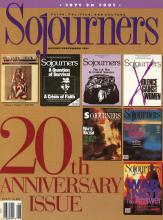In late 1990, the 20th-anniversary edition of a book of monumental importance was released. The context that helped give rise to an alternative Christian community also was the subject of James Cone's A Black Theology of Liberation. The Spirit was indeed moving in many places.
In that book, newly re-released by Orbis Books (1990, $14.95, paper), Cone sets forth a series of insightful propositions about the role of the black church in the black power movement and the role of Jesus, God, and the Holy Spirit in the black community. And in the 1990 edition, we are treated to responses by such theologians as Gayraud Wilmore, Rosemary Radford Ruether, Delores Williams, Pablo Richard, K.C. Abraham, and Robert McAfee Brown. These writers bring '90s analysis to Cone's 1970 prophetic words.
Cone continues his tradition of keeping his finger on the pulse of the issues of our times in his 1991 offering Martin & Malcolm & America: A Dream or a Nightmare (Orbis Books, $22.95, cloth). Translating all of his earlier perspective into the questions facing the last decade of the century, Cone provides a blueprint for the black church as it searches for its home in modern America.
Martin King and Malcolm X each represent a significant experience of African Americans. Most simply, the question is one of assimilation (integration) or nationalism (self-segregation). And the question must be raised because people of color have not as a group been invited to participate at the core of defining America. Cone brilliantly draws upon both leaders to develop a picture of an empowered African-American community for the future.
Read the Full Article
